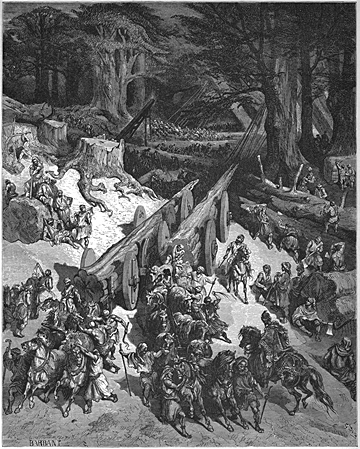1 Mpanjaka 5
1 Nirahe’ i Kirame, mpanjaka’ i Tsore mb’amy Selomò mb’eo o mpitoro’eo, ie nahajanjiñe t’ie norizañe ho mpanjaka handimbe an-drae’e; amy te nainai’e nimpirañetse amy Davide t’i Kirame.
When Hiram king of Tyre heard that Solomon had been anointed king to succeed his father, he sent ambassadors to Solomon because Hiram had always been David's friend.
2 Aa le nampihitrife’ i Selomò amy Kirame, ty hoe:
So Solomon sent this message back to Hiram,
3 Fohi’o te tsy nahafamboatse anjomba ho a i tahina’ Iehovà Andrianañahare’ey t’i Davide raeko, ty amo hotakotake niariseho azeo ampara’ t’ie napo’ Iehovà ambane’ o lelam-pandia’eo.
“As you know, my father David was not able to build a Temple to honor the Lord his God because of the wars fought against him from every direction, until the Lord had conquered his enemies.
4 Fe tinolo’ Iehovà Andrianañahareko fitofàñe ty miariary ahy iaby henanekeo, amy t’ie tsy aman-drafelahy ndra raha mizo.
But now the Lord my God has given me peace all around—no enemies, no bad things happening.
5 Ingo, hoe ty volako, Handranjiako anjomba ty tahina’ Iehovà Andrianañahareko, ty amy tsinara’ Iehovà an-draeko Davidey, ty hoe: Ty ana’o hampiambesarako am-piambesa’o ty hamboatse anjomba ho ami’ty añarako.
So I plan to build a Temple to honor the Lord my God, as the Lord told my father David. He said to him, ‘Your son whom I will place on your throne to succeed you will build the Temple to honor me.’
6 Aa le lilio ty hamiràñe mendoraveñe e Lebanone ao, le hindre amo mpitoro’oo o mpitorokoo vaho hatoloko ama’o ho a o mpitoro’oo ty tambe toñone’o ho a iareo, ie fohi’o te tsy ama’ay ty mahafira hatae manahake o nte-Tsidoneo.
So please order some cedars of Lebanon to be cut down for me. My workers will assist your workers, and I will pay your workers at the rate that you decide, for you know that we don't have anyone who knows how to cut timber like the Sidonians.”
7 Ie jinanji’ i Kirame i saontsi’ i Selomòy le vata’e nirebeke vaho nanao ty hoe: Andriañeñe t’Iehovà henane zao, Ie nanolotse i Davide anake mahihitse hifeleke ondaty jabajaba retoañe.
When Hiram heard Solomon's message, he was very happy and said, “Praise the Lord today, for he has given David a wise son to lead this great nation!”
8 Aa le nahitri’ i Kirame amy Selomò ty hoe: Fa tsinanoko i nañitrifa’o ahiy le hene hanoeko o satrien’ arofo’oo amo mendoraveñe naho haradrantoo.
Hiram sent this reply to Solomon: “Thank you for your message. As for the cedar and cypress timber, I will do everything you want.
9 Hazotso’ o mpitorokoo boake Lebanone pak’ an-driak’ añe izay; le hamboareko t’ie hihafo amy riakey handenà’ iereo mb’amy toetse hatoro’o ahio, naho hakatrak’ añe, vaho ho rambese’o; le ihe ty hañeneke i fañiriakoy te hamahana’o mahakama ty akibako.
My workers will bring the logs down from Lebanon to the sea, and I will have them floated in rafts by sea to wherever you decide. I will have the rafts broken apart there, and you can take the logs away. In return I would like you to provide food for my household.”
10 Aa le natolo’ i Kirame amy Selomò ze fonga mendoraveñe naho haradranto nipaia’e.
So Hiram provided Solomon with as much cedar and cypress timber that he wanted,
11 Natolo’ i Selomò amy Kirame ka ty vare-bolè ro’ale kore hamahana’e o añ’anjomba’eo, naho menake finofoke roapolo kore; izay ty natolo’ i Selomò amy Kirame taoñ’ an-taoñe.
Solomon gave Hiram 20,000 cors of wheat for food and 20,000 cors of olive oil for his household. Solomon provided this to Hiram every year.
12 Tinolo’ Iehovà hihitse t’i Selomò, ty amy nitsarae’e ama’ey le nifampilongo t’i Kirame naho i Selomò; vaho nifanao fañina.
The Lord gave Solomon wisdom just as he had promised him. Hiram and Solomon had a good relationship and they made a peace treaty with each other.
13 Aa le hene nampitsatoha’ i Selomò haba t’Israele, ondaty telo-ale i haba zay
King Solomon drafted a labor force of 30,000 from all of Israel.
14 vaho nampihitrife’e mb’e Lebanone mb’eo, rai-ale boa-bolañe ty nifandimbe, volañe raike e Lebanone añe naho roe volañe añ’ anjomba’e ao; i Adonirame ty nifehe i hàbay.
He sent them in shifts of 10,000 each month to Lebanon, so that they were one month in Lebanon and two months at home, Adoniram was in charge of the labor force.
15 Fito-ale ty mpijiny kilanka’ i Selomò naho valo-ale ty namira am-bohitse añe;
Solomon had 70,000 porters and 80,000 stonecutters in the hill country,
16 mandikoatse izay o mpifehe’ i Selomò nifelek’ o fitoloñañeoo: telo-arivo-tsi-telon-jato ty nifeleke ondatio amo fitoloña’eo.
as well as 3,300 foremen he placed in charge of the workers.
17 Nandily t’i Selomò vaho nihaliañe vato jabajaba, vato soa, handranjiañe o mananta’ i anjombaio am-bato pinèke.
Following the king's orders, they quarried large blocks of stone that were expensive to produce, and laid these dressed stones as the foundation for the Temple.
18 Aa le rinamerame’ o mpandranji’ i Selomòo naho o mpamboa’ i Kirameo naho o nte-Gebaleo irezay, naho nañalankañe o hatae vaho vato nandranjiañe i anjombaio.
So Solomon's and Hiram's builders, together with the Gebalites, cut the stone. They prepared the timber and stone to build the Temple.





















